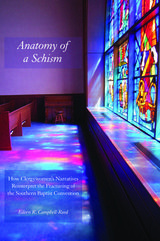
From 1979 to 2000, the Southern Baptist Convention (SBC) was mired in conflict, with the biblicist and autonomist parties fighting openly for control. This highly polarizing struggle ended in a schism that created major changes within the SBC and also resulted in the formation of several new Baptist groups. Discussions of the schism, academic and otherwise, generally ignore the church’s clergywomen for the roles they played and the contributions they made to the fracturing of the largest Protestant group in the United States. Ordained women are typically treated as a contentious issue between the parties. Only recently are scholars beginning to take seriously these women’s contributions and interpretations as active participants in the struggle.
Anatomy of a Schism is the first book on the Southern Baptist split to place ordained women’s narratives at the center of interpretation. Author Eileen Campbell-Reed brings her unique perspective as a pastoral theologian in conducting qualitative interviews with five Baptist clergywomen and allowing their narratives to focus attention on both psychological and theological issues of the split. The stories she uncovers offer a compelling new structure for understanding the path of Southern Baptists at the close of the twentieth century. The narratives of Anna, Martha, Joanna, Rebecca, and Chloe reframe the story of Southern Baptists and reinterpret the rupture and realignment in broad and significant ways. Together they offer an understanding of the schism from three interdisciplinary perspectives—gendered, psychological, and theological—not previously available together. In conversation with other historical events and documents, the women’s narratives collaborate to provide specific perspectives with universal implications for understanding changes in Baptist life over the last four decades.
The schism’s outcomes held profound consequences for Baptist individuals and communities. Anatomy of Schism is an illuminating ethnographic and qualitative study sure to be indispensable to scholars of theology, history, and women’s studies alike.

Since 1979 Southern Baptists have been noisily struggling to agree on symbols, beliefs, and practices as they attempt to make sense of their changing social world. Nancy Ammerman has carefully documented their struggle. She tells the story of the Baptist reversal from a moderate to a fundamentalist outlook and speculates on the future of the denomination.
Ammerman places change among the Southern Baptists in the context of the cultural and economic changes that have transformed the South from its rural past into an urbanizing, culturally diverse region. Not only did the South change; Southern Baptists did as well. Reflecting this diversity, the Southern Baptist bureaucracy was relatively progressive. During the 1960s and 1970s, moderate sentiments prevailed, while fundamentalists remained on the margins. These two were, however, becoming increasingly divergent in what they considered important about being a Baptist, in their views about the Bible, in their attitudes on the origination of women, on Christian morals, and on national politics.
Late in the 1970s, a fundamentalist coalition emerged, followed by unsuccessful efforts by moderates to oppose it. The battles escalated until 1985, when 45,000 Baptists gathered in Dallas to decide between contending presidential candidates. That dramatic event illustrated the extent to which organized political resources were determining the course of the conflict. Ammerman studies these strategies and resources as well.
Examining how this tension affected Baptists, Ammerman begins with case studies of the change it is producing in Baptist agencies. But she also brings us back to the local churches and individual believers who are renegotiating their relationships within their denomination. She asks whether the denomination’s polity can accommodate an increasingly diverse group of Baptists, of whether the only way dissidents can have a voice is through schism.
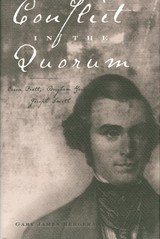
At a meeting of the LDS Quorum of the Twelve in 1860, one of the church’s senior apostles, Elder Heber C. Kimball, complained that “Brother Orson Pratt has withstood Joseph [Smith] and he has withstood Brother Brigham [Young] many times and he has done it tonight and it made my blood chill. It is not for you to lead [the prophet],” Kimball continued, “but to be led by him. You have not the power to dictate but [only] to be dictated [to].”
Whenever the quorum discussed Elder Pratt’s controversial sermons and writings and his streak of independent thinking, the conversation could become heated. As documented by Gary James Bergera in this surprisingly suspenseful account, Pratt’s encounters with his brethren ultimately affected not only his seniority in the Quorum of the Twelve but also had a lasting impact on LDS doctrine, policy, and organizational structure.
“There is not a man in the church that can preach better than Orson Pratt,” Brigham Young told the twelve apostles on another occasion. “It is music to hear him. But the trouble is, he will … preach false doctrine.”
Pratt responded that he was “not a man to make a confession of what I do not believe. I am not going to crawl to Brigham Young and act the hypocrite. I will be a free man,” he insisted. “It may cost me my fellowship, but I will stick to it. If I die tonight, I would say, O Lord God Almighty, I believe what I say.”
“You have been a mad stubborn mule,” Young replied. “[You] have taken a false position … It is [as] false as hell and you will not hear the last of it soon.”
Not infrequently, these two strong-willed, deeply religious men argued. Part of their difficulty was that they saw the world from opposing perspectives—Pratt’s a rational, independent-minded stance and Young’s a more intuitive and authoritarian position. “We have hitherto acted too much as machines … as to following the Spirit,” Pratt explained in a quorum meeting in 1847. “I will confess to my own shame [that] I have decided contrary to my own [judgment] many times. … I mean hereafter not to demean myself as to let my feelings run contrary to my own judgment.” He issued a warning to the other apostles: “When [President Young] says that the Spirit of the Lord says thus and so, I don’t consider [that] … all we should do is to say let it be so.”
For his part, Young quipped that Pratt exhibited the same “ignorance … as any philosopher,” telling him “it would be a great blessing to him to lay aside his books.” When Pratt appealed to logic, Young would say, “Oh dear, granny, what a long tail our puss has got.”
Ironically, Orson Pratt would have the last word both because Young preceded him in death and because several of Young’s teachings and policies had proven unpopular among the other apostles. One of Young’s counselors said shortly after the president’s death that “some of my brethren … even feel that in the promulgation of doctrine he [Young] took liberties beyond those to which he was legitimately entitled.” Meanwhile, Pratt continued to hold sway with some of his colleagues. His thoughtful—if ultra-literalistic—interpretations of scripture would also influence such later church leaders as Joseph Fielding Smith and Bruce R. McConkie.
Bergera’s nuanced approach avoids caricatures in favor of the many complexities of personalities and circumstances. It becomes clear that the conflict in which these men found themselves enmeshed had no easy, foreseeable resolution.
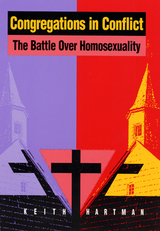
A Methodist church puts its minister on trial after he marches in a gay rights parade. A Quaker meeting struggles to decide whether to marry a lesbian couple. An entire congregation is thrown out of the Southern Baptist Convention for deciding that a gay divinity student had a sincere calling to the ministry, and an order of celibate monks comes out of the closet. An Episcopal priest blesses two same-sex relationships--then a closeted gay lawyer leads the charge to have him fired.
Homosexuality is the most divisive issue facing churches today. Like the issue of slavery 150 years ago, it is a matter that ignites passionate convictions on both sides, a matter that threatens to turn members of the same faith against each other, to divide congregations, and possibly even to fragment several denominations. Like slavery, it is an issue that calls up basic questions about what it means to be a Christian. How does one know right from wrong? Is the Bible fallible? Do good Christians always follow their church's teachings, or are they allowed to think for themselves on moral issues? And to what source does one finally look to determine what God really wants?
While many books have been written analyzing the scriptural and theological dimensions of the conflict, none has yet shown how it is being played out in the pews. Congregations in Conflict examines nine churches that were split by disagreements over gay and lesbian issues, and how the congregations resolved them.
Hartman explores in very readable prose how different denominations have handled their conflicts and what it says about the nature of their faith. He shows some churches coming through their struggles stronger and more unified, while others irrevocably split. Most importantly, he illuminates how people with a passionate clash of beliefs can still function together as a community of faith.
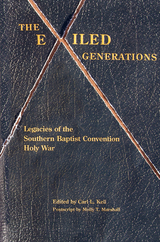
Until now, the stories of this “lost generation” have never been fully told. In this collection, Professor Kell presents a diverse and wide range of voices. Some are well-known Baptist leaders, while others are ordinary people caught up in the remarkable changes in Baptist life over the past few decades. Here, they recount their feelings of loss as they were severed from youth fellowships and removed from church rolls. Many describe the lingering emotional effects of the heartbreaking conflict that dominated their childhood and adolescence. Their recollections reveal the full range of responses—anger, sadness, pathos, humor, intense inner reflection—to these enormous shifts. This volume shows the extent to which this group has struggled and wandered in emotional and religious exile.
The Exiled Generations comprises rich primary sources for scholars and students who are exploring the profound strife that has rocked the Southern Baptist Convention. These deeply moving accounts will offer invaluable assistance to researchers analyzing the impact of the seismic changes within the denomination over the past thirty-five years.
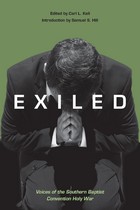
tactics to gain top positions and then used their power to purge Baptist seminary presidents and professors, church pastors, lay leaders, and women from positions of responsibility. America's largest Christian, non-Catholic denomination is firmly locked in a “holy war” to secure its churches and membership for a never-ending struggle against a liberal culture.
Exiled: Voices of the Southern Baptist Convention Holy War is a compilation of first-person narratives by conservative and moderate ministers and lay leaders who were stripped of their positions and essentially became pariahs in the churches to which they had devoted their lives.
While other books have described the takeover in historical, political, and theological terms, Exiled is different. Individual people tell their personal stories, revealing the struggle and heartache that resulted from being vilified, dispossessed, and exiled. Kell includes a variety of perspectives-from lay preachers and church members to prominent former SBC leaders such as James Dunn and Carolyn Crumpler.
The emotion captured on the pages-sadness, shock, disbelief, resignation,
and anger-will make Exiled moving even to readers who know little about the Southern Baptist movement. Exiled will also be of particular interest to historians, sociologists, philosophers of religion, and rhetorical historians.
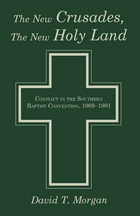
Examines the conflict between modern-day Southern Baptists and “liberal” Southern Baptists over control of the Southern Baptist Convention
David Morgan captures the essence of the conflict between some modern-day Southern Baptists, who saw themselves as crusaders for truth, as they sought to redeem a new holy land--the Southern Baptist Convention-- from the control of other Southern Baptists they viewed as "liberals." To the so-called liberals, the crusaders were "fundamentalists" on a mission, not to reclaim the SBC in the name of theological truth but to gain control and redirect its activities according to their narrow political, social, and theological perspectives. The New Crusades provides a comprehensive history of the conflict, taking the reader through the bitter and divisive struggles of the late 1980s, that culminated in the 1991 emergence of a moderate faction within the SBC. The fundamentalists had won.
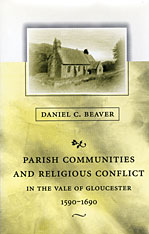
Many historians have attempted to understand the violent religious conflicts of the seventeenth century from viewpoints dominated by concepts of class, gender, and demography. But few studies have explored the cultural process whereby religious symbolism created social cohesion and political allegiance. This book examines religious conflict in the parish communities of early modern England using an interdisciplinary approach that includes all these perspectives.
Daniel Beaver studies the urban parish of Tewkesbury and six rural parishes in its hinterland over a period of one hundred years, drawing on local ecclesiastical court records, sermons, parish records, corporate minutes and charity books, and probate documents. He discusses the centrality of religious symbols and ceremonies in the ordering of local societies, particularly in local conceptions of place, personal identity, and the life cycle. Four phases in the transformation of parish communities emerge and are examined in this book.
This exploration of the interrelationship of religion, politics, and society, and the transformation of local communities in civil war, has a value beyond the particular history of early modern England, contributing to a broader understanding of religious revivals, fundamentalisms, and the persistent link between religion, nationalism, and ethnic identity in the modern world.
READERS
Browse our collection.
PUBLISHERS
See BiblioVault's publisher services.
STUDENT SERVICES
Files for college accessibility offices.
UChicago Accessibility Resources
home | accessibility | search | about | contact us
BiblioVault ® 2001 - 2024
The University of Chicago Press









